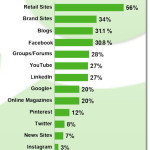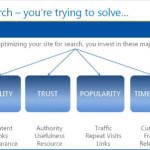Why just sell when you can social sell and generate 8X ROI? Something that compels businesses to invest in social selling to advance their lead generation engine and beat the competitors.
However, as we run the race against the competition, we often, unintentionally, deviate from the core concept of social selling. The problem begins with the approach that primarily addresses “Expert Tips and Tricks,” rather than the core principles. While what you do may appear excellent to you, it might end up boring the customers gradually making you a victim of your own expertise.
Let’s get to the root of the problem, here are the fundamentals you should consider before planning your social selling campaigns.
#1. The right social media platform
Navigating through the sea of social media platforms is overwhelming. While every platform has good and bad features, it is not always obvious how to find the highest potential in each. But do all of them fit your business goals? Possibly not.
Rather than latching onto every social media platform, determine what works best for your customers, team, and resources. Keep the ones that help you nurture relationships with authenticity, build trust, and yield higher conversions. Focus on the channels that connect you with the target audience, drive engagement, and boost revenues.
#2. Social listening and engagement
Audience listening matters. A LOT.
Social listening may be among the most neglected tasks in social selling. Many brands prefer talking rather than listening while crafting a strategy that according to them is the BEST. Don’t forget, customers are the lifeblood to your business, and they can’t be overlooked. You must listen to them.
i. Find the people to follow
First things first, find the audience that talks about your industry. Go through the social channels, determine relevant keywords, hashtags, products, and organizations that share the same interests as you. Once you have this list, segregate them into categories such as competitors, influencers, bloggers, supporters, affiliate marketers, PRs, etc. Follow up by connecting with the most important ones.
ii. Configure your social listening tools
Social media conversations are rapid. So, answering a buyer’s query hours after they have made it is no good. Chances are they have already found the answer. This calls for automated social listening tools that send you alerts via emails and texts every time certain keywords/ products are mentioned, or an attention-worthy discussion initiates.
iii. Engage
Once you have made the initial contact with a potential buyer online, take to the social channels to interact with them. Keep providing relevant and useful information in a personable manner to build their trust.
If you still don’t trust your blogging skills and how your writing style could relate with the readers, we recommend you try an anonymous platform to refine and develop your blogging skills so that you assure that your ideas and thoughts reach your audience like the Doe platform.
#3. (SIMPLE) Content is the king
As we mentioned, the business landscape is competitive. The environment calls for cutting-edge content that reflects that you have an upper hand over the rivals. This is why we see inflation in brands sharing more sophisticated content.
However, contrary to your expectations, this kind of content often backfires.
Customers want to be treated for what they are: a customer. They need simple and obvious content that is easy for them to grasp–answer their questions, provide quick and fun how-tos for topics from your niche, publish videos, quizzes, and surveys. Make sure to stay close to them. Talk in the fun-filled language that they can understand and don’t shy away from using emojis.
#4. Automation- In just the right amount
Automatic tools may look like a promising solution to make social selling easier. However, there is a catch here. Social media is accustomed to social interactions, and that’s how your buyers like it. Don’t go overboard automating with social selling tools. Let the audience identify with your brand’s human touch rather than another letting yourself devolve into another brand with the personality of a bot.
#5. Educate and entertain- don’t run after selling
Brands tend to take selling in social selling as their prime agenda. Plenty of enterprises define engagement as shoving sales pitches down the throats of customers. And that’s where you lose the battle by beating around the bush.
Buyers hate the idea of being “sold to.” Don’t forget it is an information age. Avoid pushing your products and services to the potential leads. Instead, keep them informed and reflect your expertise by producing content that the target audience would love.
#6. Analysis and growth go hand in hand
You may have a social selling strategy that stands out. But if it does not bring the expected results, is it actually worthwhile? Certainly not. That’s where analytics can help you. Keep your strategy under regular examination. Determine what brings results and identify the pain points. Once you have the findings, implement them to customize the social selling strategy while addressing the challenges and enhancing the opportunities.
Signing off
Jumping on the social selling bandwagon without knowledge of these principles is like jumping into the sea without knowing how to swim. You may end up ok for a while, but eventually, you just drown. Make sure to keep the fundamentals in mind when creating a social selling strategy for your brand. That will not only sharpen your marketing spear, but will also lead your efforts in the right direction.
Author Bio:
Milan Ruzicka is passionate about helping sales and marketing teams discover the opportunity of social selling. He uses his 15+ years of B2B marketing and management experience and founded ReadyForSocial together with Sander Biehn. He is passionate to keep making the Thought Horizon social selling method better and better by fact-based, data-driven improvements. Milan loves technology, gaming, skiing and books (non-fiction and military sci-fi as a guilty pleasure).
Twitter: https://twitter.com/RuzickaMilan
LinkedIn: https://www.linkedin.com/in/milanruzicka/











